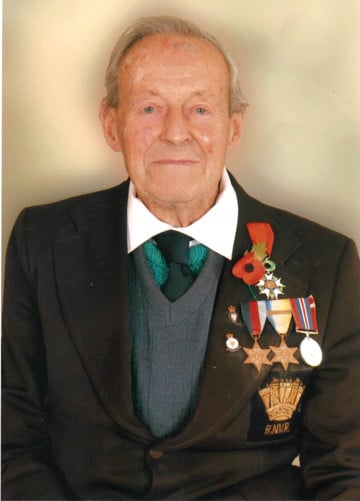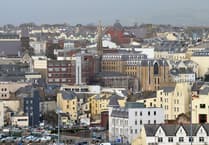World War Two veteran John Christian Crellin, from Andreas, has passed away aged 98 - we spoke to longtime friend Bob Teare to find out more on his life.
John served as a gunnery officer on destroyer warships, seeing action in some of the war’s most historic events, such as the allied landings at D-Day.
He had signed up via the Royal Naval Volunteer Reserve, and served on the battleship HMS Malaya as she protected the shipping convoys travelling to Malta, and HMS Vidette with the Atlantic convoys.
The incident which had prompted him to join was witnessing an RAF plane crash in Lezayre, which impressed upon him that the war had come home to the island.
His duties on the destroyers involved working closely with the crew manning the depth charges, which were dropped into the water to sink the German U-boats that were attacking the convoys.
Bob said he once asked John whether he felt bad for the crews of the submarines which his destroyer sank, and he replied: ’No, because they were trying to kill us.’
At D-Day, his destroyer was among the few allied ships tasked with closely shelling the German shore positions at Omaha beach - which had been raining death and destruction down on the American assault troops who were trying to land there. After the war, he went for a time to New Zealand, where he was involved in deep sea diving.
He then returned to his native Andreas to take up farming, and would later serve as Captain of the Parish.
Bob said that he first met him at an agricultural show in the 1980s, the likes of which John would often bring his beekeeping hives along to - one of his many interests.
Bob, now a Manx teacher, said that John unexpectedly began speaking to him in Manx, a language which John was always keen to help people practice.
John would also compile Manx words that might not have been recorded in dictionaries - such as the names of fields around the north.
For his wartime service John would also go on to be awarded the Légion d’honneur, France’s highest honour. However, Bob said that the veteran was unsure about accepting the award, because he had seen so many people die and wanted to make it clear that he was receiving the medal on behalf of his fellow servicemen who didn’t survive the war.
Bob added that it was only after this that John ever spoke about his wartime experiences, such as those on D-Day, and that was only because he had asked him.
He said that John was ’the toughest person’, who rarely switched the heating on, and who up until just a few years ago could be seen riding around on his bicycle.
Another friend, Fiona McCardle, who met him at an evening Manx class at Ramsey Grammar School in 1975, said of him: ’John was always a determined man - he wanted, and had the ability, to excel in many pursuits such as farming, fishing, diving.
’He had a great thirst for knowledge which never left him.
’In farming he admired the ways of the old country people he had known in his youth and the careful ways they looked after the land.’
’His interests encompassed all aspects of Manx history, language and culture for which he was honoured by Tynwald as Yn Lhaider and by the Manx Heritage Foundation’s Reih Bleeaney Vannanan.’
She also talked about how he was involved with setting up Manx language centre Thie ny Gaelgey, where he worked with Manx speaking friend Leslie Quirk, and a trustee of the Manx Museum and National Trust for 35 years.
He was husband to the late Vi, and had three brothers - Geoffrey and the late Robin and Murray.



-(1).jpeg?width=209&height=140&crop=209:145,smart&quality=75)
.jpg?width=209&height=140&crop=209:145,smart&quality=75)
Comments
This article has no comments yet. Be the first to leave a comment.